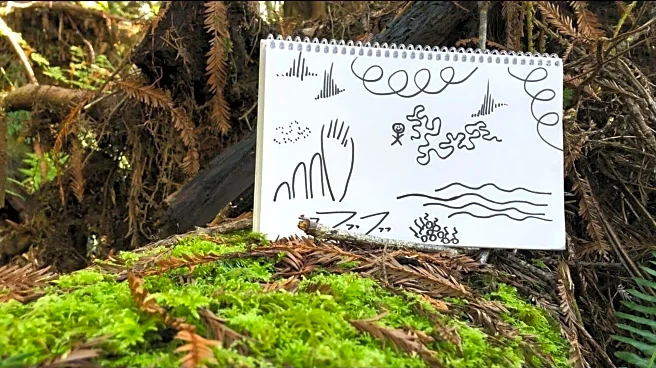Six thousand new words were also added to the dictionary in 2025, including ’delulu’, ’slop’, ’skibidi’ and ’tradwife’.
According to Cambridge officials, the year was marked by interest in one-sided parasocial relationships that people form with celebrities, influencers and AI chatbots.
When Taylor Swift and Travis Kelce announced their engagement, many fans felt a deep connection to the singer and the American footballer, even though most had never met them.
Also read: Dictionary.com's word of the year is '6-7'; but is it even a word and what does it mean?
Millions of fans related to Taylor Swift’s confessional lyrics about dating, heartbreak and desire, leading to what psychologists describe as ”parasocial” bonds with stars.
Lily Allen’s ”breakup album” ”West End Girl” leant into parasocial interest in her love life. The spontaneity, imperfection and confessional nature of podcast hosts have been said to replace real friends and to catalyse parasocial relationships.
The emergence of parasocial relationships with AI bots saw people treat ChatGPT as a confidant, friend or even romantic partner. These led to emotionally meaningful – and in some cases troubling – connections for users, and concerns about the consequences.
”Parasocial captures the 2025 zeitgeist. It’s a great example of how language changes. What was once a specialist academic term has become mainstream. Millions of people are engaged in parasocial relationships; many more are simply intrigued by their rise. The data reflects that, with the Cambridge Dictionary website seeing spikes in lookups for parasocial,” Colin McIntosh of the Cambridge Dictionary said.
”The language around parasocial phenomena is evolving fast, as technology, society and culture shift and mutate: from celebrities to chatbots, parasocial trends are fascinating for those who are interested in the development of language,” he added.
The term parasocial dates back to 1956, when University of Chicago sociologists Donald Horton and Richard Wohl observed television viewers engaged in ”para-social” relationships with on-screen personalities, resembling those they formed with ”real” family and friends. They noted how the rapidly expanding medium of television brought the faces of actors directly into viewers’ homes, making them fixtures in people’s lives.
In 2025, the ”chronically online” developed parasocial relationships with YouTubers and influencers who they feel they know, becoming invested in all the twists and turns of their personal lives.
Also read: UN food agency warns of deepening hunger crisis as funding falls short
The global mania around ”The Summer I Turned Pretty” finale saw fans dissecting every romantic relationship in the drama series on TikTok and Instagram, as they encamped into ”Team Conrad” or ”Team Jeremiah”.
Simone Schnall, professor of Experimental Social Psychology at the University of Cambridge, explained that parasocial is an inspired choice for Word of the Year.
”The rise of parasocial relationships has redefined fandom, celebrity and, with AI, how ordinary people interact online. We have entered an age where many people form unhealthy and intense parasocial relationships with influencers. This leads to a sense that people ’know’ those they form parasocial bonds with, can trust them and even to extreme forms of loyalty. Yet it is completely one sided.
”As trust in mainstream and traditional media breaks down, people turn to individual personalities as authorities, and – when they spend many hours consuming their content – develop parasocial bonds, treating them more like close friends, family or cult leaders. When an influencer has so many followers, people assume they are trustworthy,” Schnall said.
Other words that had a significant impact in 2025 include ’slop’, ’pseduonymization’, ’vibey’, ’breathwork’, ’doomspending’ and ’memeify’.
While ’slop’ refers to content on the internet that is of very low quality, especially when it is created by artificial intelligence, ’pseudonymization’ is a process in which information that relates to a particular person, for example, a name or email address, is changed to a number or name that has no meaning so that it is impossible to see who the information relates to.
’Skibidi’ is a humorous slang term with varied meanings, including ”cool,” ”bad,” or even used with no meaning at all for a joke.
’Delulu’ is a play on the word delusional, which means believing things that are not real or true, usually because you choose to.
The Cambridge dictionary defines ’tradwife’ as a a married woman who stays at home, taking care of the cooking, cleaning and children and shares this lifestyle on social media. ’Memeify’ is to turn an event, image or person, into a meme (an idea, joke, image, or video that spreads very quickly on the internet).
’Glazing’ is the excessive use of praise or flattery, especially by AI chatbots, in a way that seems insincere and artificial. It is sometimes seen as a way of compensating for weak input from an AI. ’Vibey’ describes a place that has a good vibe. ’Breathwork’ is a technique that involves the conscious control of your breathing and is intended to produce physical and mental benefits.
’Doom spending’ is the activity of spending money that you cannot afford in order to make yourself feel better. People sometimes engage in it when they feel anxious and uncertain about the future.
/images/ppid_59c68470-image-176346753295756501.webp)






/images/ppid_a911dc6a-image-177089857481720650.webp)

/images/ppid_a911dc6a-image-177089866690032944.webp)
/images/ppid_a911dc6a-image-177089871495294861.webp)
/images/ppid_a911dc6a-image-177089853476914935.webp)
/images/ppid_a911dc6a-image-177089863165870219.webp)

